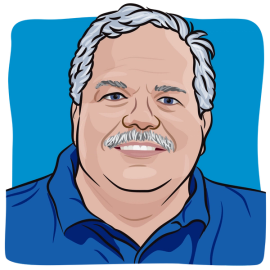- About Us
- Advertise / Support
- Editorial Board
- Contact Us
- CancerNetwork.com
- TargetedOnc.com
- OncLive.com
- OncNursingNews.com
- Terms & Conditions
- Privacy
- Do Not Sell My Information
- Washington My Health My Data
© 2025 MJH Life Sciences™ and CURE - Oncology & Cancer News for Patients & Caregivers. All rights reserved.
Lessons From Cancer Survivorship

Joe Bullock was diagnosed in May of 2018 with stage 3b colorectal cancer after a routine colonoscopy at age 50. During the colonoscopy his GI doctor at Duke Cancer Center found two polyps and a 1Ocm tumor in my colon. He had surgery to remove the tumor, and the surgeon reconnected his colon, and he had 40 lymph nodes removed. Three of those polyps tested positive for cancer.
Nowadays, I think of myself more as a cancer survivor and advocate than patient. Here's what I learned along the way.
I am at a point in my cancer survivorship that I find myself thinking less as a cancer patient and more as an advocate as it pertains to cancer. It’s hard not to see myself as one or the other but, I’m no longer a cancer patient. I have spent so much of my time these last five years educating myself about my disease, so it seems like a natural progression in my life.
I have one more set of CT scans and bloodwork early next year before I’m officially released from my oncologist. I am getting ready to walk through that door of survivorship permanently and into the rest of my life.
I am almost five years NED (no evidence of disease) from stage 3b colorectal cancer and with that, my chances of recurrence have lessened greatly over the last few years. I think mentally it's a place I need to go to support my survivorship. I am worried enough that my cancer is going to return but it can’t prevent me from living my life.
Being able to use my learned experiences as a cancer patient is important to me so I may stay connected to a community that I have grown to love.
I have been called “the lucky one” by some well-meaning people because I survived cancer. When they hear that I was diagnosed in the lower stage, you can instantly see their sigh of relief on their face. The awful untruth and stigma behind cancer is that if you are diagnosed with cancer, you will eventually die from it.
Many cancers are preventable or highly treatable if proper health screening protocols are followed. Sadly, at times access is not available for proper and timely health screenings of some of the population. Being able to advocate so the resources are available to everyone is important to me.Average people are sometimes fearful to be seen by a doctor because they worry about unfavorable medical outcomes. Most people see cancer as a death sentence and if I’m truthful with myself, I did as well before I was diagnosed. I avoided my health screenings because I was worried about the likelihood of being diagnosed with cancer. It was one of those routine screenings, a colonoscopy, that saved my life.
One of the hardest hurdles for a cancer survivor like me is the struggle I have with survivor's guilt. As a cancer advocate, I carry a lot of the stories of the people who weren’t so lucky and didn’t survive this disease like me. A few of them had taught me how to be an advocate and to share my story to have a greater impact in the cancer space. There are those moments that I wonder why I am still here advocating, and they are not. When I get the opportunity to share my story as a part of my advocacy platform, I find myself carrying the stories of these incredible people with me. I share their stories alongside mine whenever I get the opportunity. This helps me to have purpose as a cancer survivor and lessens the guilt of my survivorship.
One of the most important lessons I have learned over the years as a cancer survivor is to hold space for my friends who find themselves in the midst of cancer treatment. It’s not about comparing our cancer treatments or if one stage is worse than the other. I had to allow myself to set aside my own fears of recurrence and learn to just be in that moment with them.
The other day I got to visit with and watch a friend of mine who is a stage 4 patient finally be able to do something that he truly loves to do after months of recovery from surgery. He was still in the weeds of his chemotherapy treatments, but you could tell by the smile on his face that he was in his happy place and doing what he loved to do in this life. For a patient with stage 4 disease, that is not a regular occurrence because most of your days are spent fighting the disease.
As I continue my life’s journey, I will take these lessons I have learned as a cancer patient and survivor to have a greater impact on the cancer community. I will look for those opportunities to advocate for others because I know the ones that have left me would want me to continue the fight for them. I will continue to hold space for others in the cancer fight even till the end. No one should have to fight cancer alone if they choose not to in this life.
These are just a few lessons I have learned in my personal cancer journey and there will be more to come.
For more news on cancer updates, research and education, don’t forget to subscribe to CURE®’s newsletters here.
Related Content:



